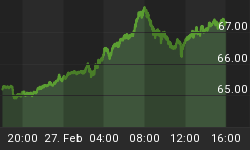Despite vocal criticism of the Federal Reserve's stewardship of the economy over the past decade, President Obama's renomination of Ben Bernanke to a second term as Fed Chairman nevertheless served to reassure and boost financial markets. While it is true that markets tend to crave predictability from government, rewarding the continuation of horrible Bush-era policies is perhaps pushing the boundaries of nostalgia. More interestingly, President Obama, who campaigned for 'change,' has clearly come down once again on the side of continuity.
In supporting his nomination, the President described Bernanke as "an expert on the causes of the Great Depression," reminding everyone that Bernanke had "approached a financial system on the verge of collapse with calm and wisdom." These were fine-sounding words, but they ignore the crucial fact that long before he moved into the Chairman's office, Bernanke was an active member of the Federal Open Markets Committee, the Fed's ruling body which systematically stoked and disguised the American financial crisis. While there, he consistently downplayed the danger signs that others brought to his attention. It appears that these experiences failed to widen the Chairman's perspective, as he continues to ignore the same voices now warning that current policy will make our fiscal wounds deeper.
From his senior position under former chairman Alan Greenspan, Bernanke watched as President Bush doubled the U.S. Treasury debt to $10 trillion and raised the total federal debt to a staggering $48 trillion. He stood on the sidelines as Greenspan pushed a decline in the dollar's value of more than 50 percent since 1987. This effectively robbed not just taxpayers, but all holders of U.S. dollars of half their wealth!
Most troubling is the fact that Ben Bernanke was a chief advocate of 'easy money' in the Greenspan-led Fed, earning the nickname 'Helicopter Ben' for his threat to throw cash from helicopters to boost spending. This, along with risk-eliminating federal policy, encouraged the formation and hugely profitable growth of casino-style behemoth banks, which became 'too big to fail.'
Thankfully for his friends on Wall Street, Helicopter Ben was still at the helm when the system came crashing down. This translated into massive bailouts, funded with trillions of dollars of taxpayers' wealth. Accounting rules were changed to allow for the further camouflage of toxic assets held by the banks. Bernanke himself engaged in some mafioso behavior in forcing Bank of America to absorb an ailing Merrill Lynch. On top of it all, to keep the appearance of solvency at bankrupt institutions, banks were allowed to borrow from the Fed at zero percent and were paid interest on the reserves they held at the Fed!
Now, the same behemoth banks are even larger, with the same pit-boss managers in charge, continuing to pay themselves tens of billions of dollars in bonuses.
The federal government, already encumbered with a staggering debt, has had to rely on the creation of dollars by the Fed to finance its economic 'stimulus' and its massive corporate bailouts. This has led Congress to question where sovereignty truly lies: with the people or the bankers?
Judging by the recent spate of tea parties and town hall meetings, significant forces are rumbling at the grassroots level. Though the protesters are not so versed in economics as to understand the source of their grievances, it most certainly lies with the Fed first and foremost. Fortunately, they are sophisticated enough to understand that they are being cheated - and Bernanke is the Chief Cheat.
While keeping Helicopter Ben in office was a politically safe decision, it comes with its own dangers. There are efforts to cast this crisis as a failure of capitalism, as personified by Alan Greenspan. Greenspan has gone so far as to claim that his faith in markets was misplaced, and that more regulation is needed. Bernanke concurs, and his continued professional success only serves to cement this erroneous viewpoint. The line of official history is hardening, and the characters are becoming more firmly cast. Bernanke is emerging as the anti-Greenspan, the banker who resisted the 'seductions' of the free market. Of course, this plot fits nicely into the current Administration's plans for greater government control of everything.
The truth is that the Greenspan-Bernanke Fed was to blame for the asset bubble, but not because it trusted too strongly in capitalism. Quite the contrary, Greenspan-Bernanke ushered in a new era of big government through their Faustian bargain with Administrations from Reagan to Bush Jr. In this deal, popular social and military spending could continue indefinitely, to be repaid through the printing press. In turn, the federal government would become dependent upon the Fed for funding, and the central bank could paint itself as the savior of a disintegrating financial system. This wasn't so much a conspiracy as an alignment of interests, and it developed quite organically. To call this a failure of capitalism is to call pollution a failure of air - it is not inherent to the thing, but a corruption of it.
If Ben Bernanke is distinguished by posterity, it will be in the manner of Juan Peron, a man who was popular, powerful, but ultimately destructive. Perhaps after another four years of Bernanke's 'courageous' intervention, and its disastrous effects, America will tire of populist economics and return to the calm and wisdom of the free market.
For a more in-depth analysis of our financial problems and the inherent dangers they pose for the U.S. economy and U.S. dollar, read Peter Schiff's 2007 bestseller "Crash Proof: How to Profit from the Coming Economic Collapse" and his newest release "The Little Book of Bull Moves in Bear Markets." Click here to learn more.
More importantly, don't let the great deals pass you by. Get an inside view of Peter's playbook with his new Special Report, "Peter Schiff's Five Favorite Investment Choices for the Next Five Years." Click here to dowload the report for free. You can find more free services for global investors, and learn about the Euro Pacific advantage, at www.europac.net.















